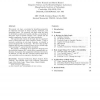Free Online Productivity Tools
i2Speak
i2Symbol
i2OCR
iTex2Img
iWeb2Print
iWeb2Shot
i2Type
iPdf2Split
iPdf2Merge
i2Bopomofo
i2Arabic
i2Style
i2Image
i2PDF
iLatex2Rtf
Sci2ools
134
click to vote
CORR
2004
Springer
2004
Springer
On Role Logic
We present role logic, a notation for describing properties of relational structures in shape analysis, databases, and knowledge bases. We construct role logic using the ideas of de Bruijn's notation for lambda calculus, an encoding of first-order logic in lambda calculus, and a simple rule for implicit arguments of unary and binary predicates. The unrestricted version of role logic has the expressive power of first-order logic with transitive closure. Using a syntactic restriction on role logic formulas, we identify a natural fragment RL2 of role logic. We show that the RL2 fragment has the same expressive power as two-variable logic with counting C2 , and is therefore decidable. We present a translation of an imperative language into the decidable fragment RL2 , which allows compositional verification of programs that manipulate relational structures. In addition, we show how RL2 encodes boolean shape analysis constraints and an expressive description logic.
CORR 2004 | Education | First-order Logic | Logic | Role Logic |
Related Content
| Added | 17 Dec 2010 |
| Updated | 17 Dec 2010 |
| Type | Journal |
| Year | 2004 |
| Where | CORR |
| Authors | Viktor Kuncak, Martin C. Rinard |
Comments (0)

